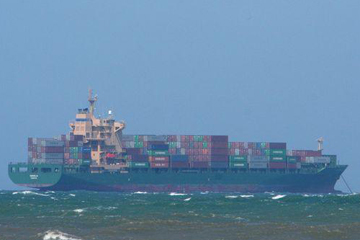
Maersk shipping containers, each with a wood floor, stacked up along the Panama Canal. Photo by: Rhett A. Butler.
The Danish shipping giant Maersk pledged this week to stop purchasing containers with floors made from uncertified tropical hardwood, reports Deutsche Welle press.
In an effort to reduce illegal logging and combat climate change, the company will be turning to recycled plastic, bamboo, and tropical wood certified by the Forest Stewardship Council (FSC) for its flooring. The Copenhagen-based firm is the first cargo company to transition to ‘green containers’ as part of a sustainable business strategy.
“Achieving sustainable development and environmental conservation will not be possible without the full engagement of the private sector, and we hope this bold move will inspire other businesses to follow suit,” Stephen Kelleher, Deputy Head of the International Union for Conservation of Nature (IUCN) Forest Conservation Program said in a press release.
 Container ship out at sea. Photo by: Rhett A. Butler. |
According to Deutsche Welle, a German media conglomerate, the shipping industry creates demand for 1.2 to 1.5 million cubic meters of tropical hardwood annually through its purchase of containers—likely illegally logged and highly damaging to rainforest ecosystems. Jacob Sterling, director of Maersk’s climate and environment division, explains that tropical hardwood is pursued by the industry because it is sturdy and inexpensive.
While Maersk expects to pay more initially for containers with green floors, the company states that it aims to “turn our success with sustainability into a competitive advantage for our company.”
Maersk has already purchased 64,000 new containers that comply with the company’s updated standards and will buy as many as 3 million more over the next five years. The company plans to have its entire fleet of containers outfitted with environmentally-friendly floors by 2029. Sterling stated that the company prefers containers with floors made from recycled plastics, but will support the manufacture of containers made from bamboo and tropical hardwood certified by the Forest Stewardship Council in order to diversify supply.
Because Maersk is a massive conglomerate, its decision to no longer purchase containers made with uncertified timber will lower demand for tropical hardwood by approximately six percent within the shipping industry, reducing deforestation and combating climate change.
Transitioning to green containers is the company’s most recent step on a path to natural capitalism, a business strategy that utilizes strong environmental and energy policies to cut costs, innovate, and prepare for a changing business climate given new environmental realities.
Maersk is also a signatory of the United Nation’s Global Compact for ethical business behavior and joined Global Compact LEAD in 2010 when the company adopted a formal sustainability strategy.
Related articles
Killing in the name of deforestation: Amazon activist and wife assassinated
(05/24/2011) José Cláudio Ribeiro da Silva and his wife, Maria do Espírito Santo da Silva, were gunned down last night in an ambush near their home in the Brazilian state of Pará. Da Silva was known as a community leader and an outspoken critic of deforestation in the region. Police believe the da Silvas were killed by hired assassins because both victims had an ear cut off, which is a common token for hired gunmen to prove their victims had been slain, according to local police investigator, Marcos Augusto Cruz, who spoke to Al Jazeera. Suspicion immediately fell on illegal loggers linked to the charcoal trade that supplies pig iron smelters in the region.
Authorities launch stealth operation in Amazon after satellite images reveal deforestation
(05/24/2011) Brazil’s environmental enforcement agency busted an illegal logging ring following analysis of satellite imagery, reports Globo.
Locals clash with ‘sustainable’ FSC logging company in the Congo
(05/22/2011) Two separate protests against logging companies by local communities have turned violent in the Democratic Republic of Congo (DRC), leaving at least one dead. According to Greenpeace, one of the companies involved in the violence, Sodefor, is sustainably certified by the Forest Stewardship Council (FSC). Given that the industry in DRC is rife with social conflict and corruption, Greenpeace is advocating that FSC place a moratorium on certifying new industrial-style logging concessions in the central African nation.













